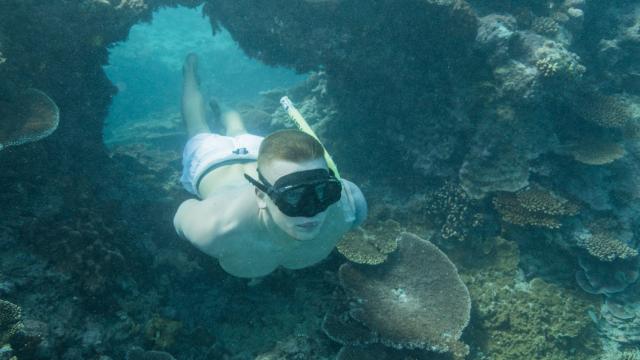The Federal Government has announced a plan to spend $500 million dollars on saving the Great Barrier Reef – the largest single investment ever committed towards the reef’s future, but that environmental activists say is still too little to preserve it in the face of climate change and ocean acidification.
Per the New York Times, Environment Minister Josh Frydenberg said the investment would go towards “improving the monitoring of the reef’s health and the measurement of its impacts. The more we understand about the reef, the better we can protect it.”
Underwater heat waves in 2016 killed off an astonishing third of the reef in 2016, according to a study published in Nature this month, causing scientists to conclude that a mass die-off in the reef is inevitable unless humans work to stem the effects of climate change. While aiming for the Paris climate agreement goal of no more than 2 degrees Celsius temperature rise would ensure some of the reef survives the next 50 years, there’s little assurance humans will actually attain that goal.
We’re not going to fix the challenge of climate change for coral reefs by killing a few starfish in Queensland https://t.co/sdD10glic8 pic.twitter.com/HCPNr5wauH
— Terry Hughes (@ProfTerryHughes) April 28, 2018
According to the Times, critics are angry that Prime Minister Malcolm Turnbull’s government has continued to subsidise gas and coal projects, including the Adani coal mine which would ship large quantities of coal near the reef. The plan does tackle the problem from several directions, however, including $200 million in funding to reduce agricultural pollution and $100 million for “reef restoration and adaptation,” which includes a project to grow stronger corals in laboratories. Other projects include killing off invasive species like the crown-of-thorns starfish and community engagement and enforcement, per the Times.
The Great Barrier Reef is really an interlinked collection of smaller reefs, with over 600 species of coral living there. While studies have shown some of these smaller reefs might help reseed ones that have died off with new life, there’s little that can be done to offset the process of coral bleaching, where corals stressed due to high temperature eject their symbiotic algae into the surrounding water. Bleaching is not always fatal, but changes of just a few degrees can trigger it. In scenarios where the rise in average global temperatures is significantly more than 2 degrees Celsius, the reefs simply will not be able to survive – and even more moderate scenarios would be hostile to the Great Barrier Reef’s longevity.
Australia’s economy is heavily reliant on coal, which fuels many of our power plants and is one of our key exports. While we pledged to cut greenhouse gas levels to 26 to 28 per cent below 2005 levels by the year 2030, per the BBC, scientists noted that level would still place Australia at a higher per-person emissions level than the US or UK. (The European Union target, for example, was 40 per cent by 2030.) According to the BBC, the Climate Council estimated Australia would need to cut emissions by 60 per cent per person to prevent going over the 2 degrees Celsius temperature rise target.
“The reef is changing faster than anyone thought it would… We’re in unchartered territory,” James Cook University coral reef studies director Terry P Hughes told the Times. “Where we end up depends completely on how well or how badly we deal with climate change.”
